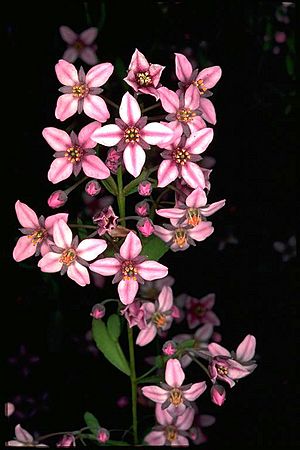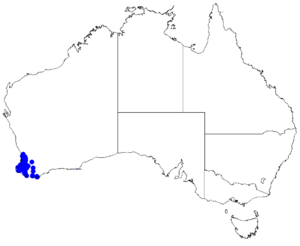Bushy boronia facts for kids
Quick facts for kids Bushy boronia |
|
|---|---|
 |
|
| Scientific classification |
|
| Kingdom: | Plantae |
| Clade: | Tracheophytes |
| Clade: | Angiosperms |
| Clade: | Eudicots |
| Clade: | Rosids |
| Order: | Sapindales |
| Family: | Rutaceae |
| Genus: | Boronia |
| Species: |
B. fastigiata
|
| Binomial name | |
| Boronia fastigiata Bartl.
|
|
 |
|
| Occurrence data from Australasian Virtual Herbarium | |
| Script error: The function "autoWithCaption" does not exist. | |
Script error: No such module "Check for conflicting parameters".
The Bushy Boronia (scientific name: Boronia fastigiata) is a beautiful plant that belongs to the citrus family, called Rutaceae. You can only find this special plant in the south-west part of Western Australia. It grows as an upright bush with small leaves and pretty clusters of red, pink, or purple flowers. Each flower has four petals and grows close to the tips of its branches.
Contents
What Does Bushy Boronia Look Like?
The Bushy Boronia is an upright bush that can grow up to about 1 meter (or 3 feet) tall. Its leaves are shaped like wide ellipses or eggs. They are usually between 10 to 20 millimeters (about 0.4 to 0.8 inches) long. Sometimes, the edges of the leaves can be slightly jagged.
The flowers of the Bushy Boronia are red, pink, or purple. They grow either by themselves or in small groups where the leaves meet the stem. Each flower has four egg-shaped sepals, which are like small leaves that protect the bud. It also has four petals that are about 7.5 millimeters (0.3 inches) long. These petals are twice as long as the sepals. Inside the flower, there are eight stamens, which are the parts that produce pollen, and they are covered in tiny hairs. You can usually see these lovely flowers blooming from September to December.
How Was Bushy Boronia Named?
The scientific name for Bushy Boronia, Boronia fastigiata, was first officially described in 1845. A botanist named Friedrich Gottlieb Bartling wrote about it in a book called Plantae Preissianae.
The second part of its scientific name, fastigiata, comes from a Latin word. This word, fastigium, means "top of a gable" or "ridge of a roof." This name likely refers to how the plant grows upright, like a roof's peak.
Where Does Bushy Boronia Grow?
You can find the Bushy Boronia growing in different areas of Western Australia. It often grows on flat ground or on hillsides, sometimes close to streams. Its natural home is between the cities of Perth, Albany, and Collie. These areas are part of specific natural regions in Western Australia, including the Jarrah Forest, Swan Coastal Plain, and Warren biogeographic regions.
Is Bushy Boronia Protected?
The Western Australian Government's Department of Parks and Wildlife has looked at the Bushy Boronia. They have officially classified it as "not threatened." This means that, for now, there are enough of these plants in the wild, and they are not considered to be in danger.
 | Isaac Myers |
 | D. Hamilton Jackson |
 | A. Philip Randolph |

